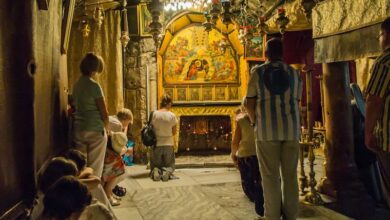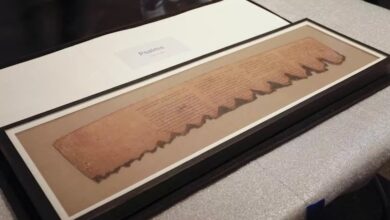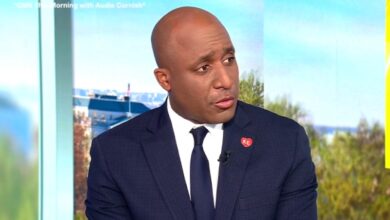Passages Americana Exhibit: Signers of the Declaration of Independence
Norm Conrad | Curator of English Bibles, Museum of the Bible |
It has been said there is nothing unique or original in the Declaration of Independence. The concept of liberty can be traced as far back as the third and fourth centuries BC, to the writings of Aristotle and Plato. John Locke, an early seventeenth-century philosopher, took these ancient ideas and influenced the thinking of Benjamin Franklin, John Adams, George Washington, and Thomas Jefferson. In Locke’s Second Treatise of Government, he wrote “reason…teaches all mankind…that being all equal and independent, no one ought to harm another in his life, health, liberty, or possessions.” The Declaration of Independence seizes upon these ideas and opens with, “We hold these truths to be self-evident, that all men are created equal, that they are endowed by their Creator with certain unalienable rights that among these are Life, Liberty and the pursuit of Happiness.”
This document is unique because of the success of the United States of America since the drafting of the Declaration of Independence on July 4, 1776. The manifestation of an ancient concept had finally been executed. This document not only announced the birth of an in dependent nation and transformed subjects into citizens, but it has become the universal benchmark for at least one hundred other countries that now possess a document that declares their independence from previous tyrannical rule.
For the complete story on the Passages Exhibit, Click HERE.
France, Norway, Belgium, Poland, Switzerland, Venezuela, Mexico, and Argentina all drew inspiration from America’s Revolution and Declaration of Independence within the first hundred years of its fruition. Thomas Jefferson wrote to John Adams in 1821, “The flames kindled on the Fourth of July, 1776, have spread over too much of the globe to be extinguished by the feeble engines of despotism; on the contrary, they will consume these engines and all who work them.”

In honor of America’s 238 years as a republic, Passages, a traveling exhibit from Museum of the Bible, will feature some of the men behind this monumental document. Currently on exhibit in Springfield, Missouri, until the end of July are documents, letters, first edition Bibles, and Bible translations authorized by Congress or produced by the signers of the Declaration of Independence. The overall Passages Exhibit is on display through the end of the year.
On exhibit is a signed Congressional document and first edition Bible imprint translated by Charles Thomson. Said by John Adams to be “the Samuel Adams of Philadelphia,” Charles Thomson was a staunch supporter of the War of Independence, the leader of Philadelphia’s Sons of Liberty, and one of only two members of the Continental Congress to sign the Declaration of Independence on July 4, 1776. John Hancock was the other signer. It was not until August 2, 1776, that the remaining 56 signers assembled to sign the Declaration of Independence.
Ironically, Thomson’s name did not appear at this signing, although his name is imprinted on the authorized Congressional page of the 1782 Aitken Bible, the first complete English Bible printed in America and authorized by the United States Congress. Upon his retirement, Thomson became the first United States citizen to translate the Bible from the Septuagint (Greek) into the English language, and to compile the first English New Testament translation in the Western Hemisphere. His Bible was published in 1808 in four volumes by Jane Aitken, the daughter of famed printer Robert Aitken, making her the first woman to print a Bible in America. This 1782 Aitken Bible is also on display at Passages.
Also featured is an autographed document signed with affixed wax seal by John Witherspoon. Witherspoon was the only clergyman to sign the Declaration of Independence and is heralded as one of America’s Founding Fathers. Witherspoon came to the colonies after accepting the position of president for the College of New Jersey, which is now Princeton University. Witherspoon was an educator, minister, congressman, and patriot. He used his pulpit and his influence to unify colonists for the cause of freedom and independence.
Thomas Jefferson was the principal author of the Declaration of Independence. Much has been said, argued, and debated as to whether Jefferson was a deist or a practicing Christian. What cannot be argued is his position on religious freedom and his opposition to religious oppression. In a letter on exhibit, Jefferson responds to the Society of the Methodist Episcopal Church in New London, Connecticut, as the third President of the United States. He wrote, “No provision in our constitution ought to be dearer to man than that which protects the rights of conscience against the enterprises of the civil authority. It has not left the religion of its citizens under the power of its public functionaries, were it possible that any of these should consider a conquest over the consciences of men either attainable, or applicable to any desirable purpose.”

Passages offers an exclusive look at these rare documents and books relating to the Declaration of Independence, in addition to the approximately 400 other biblical artifacts throughout the rest of the exhibit. This Americana exhibit is only on display in Springfield for a few months, and it is a once-in-a-lifetime opportunity for scholars, families, and anyone else to learn more about our great nation and the influence of the Bible.
For more information visit ExplorePassages.com.
— Norm Conrad, is Curator of English Bibles at the Museum of the Bible in Oklahoma City.







